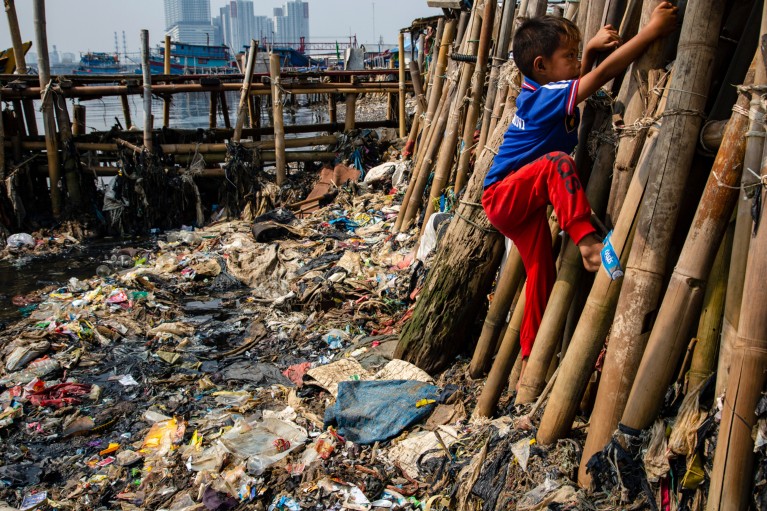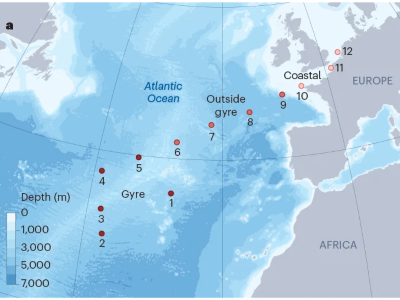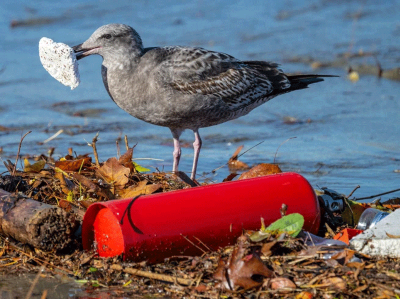
Plastics pollution is a growing environmental problem and has implications for human health.Credit: Ed Wray/Getty
Worldwide consumption of plastics is ballooning. More than half of the plastics ever made were created after 2000. On the current trajectory, annual global production is expected to double by 2050. With much of this plastic being single-use, and less than 10% of plastic waste currently being recycled, the output will continue to foul land and marine environments around the world.
This is the backdrop for the final round of negotiations on a United Nations treaty on plastics pollution, now less than a month away. Negotiators and observers from nations worldwide will gather in Geneva, Switzerland, from 5 to 14 August in the hope of agreeing a text that can make a meaningful difference.
So far, the talks have been repeatedly disrupted and delayed by nations with a vested interest in oil and plastics production, including Saudi Arabia, Iran, Russia and China. These countries, which call themselves the ‘like-minded group’, are insisting that the treaty should cover only the recycling and consumption of plastics, and oppose curbs on the production of both plastics and specific, named chemicals. As a growing mountain of research lays bare the scale of the plastics pollution problem, researchers, governments and civil society must counter these moves and ensure the agreement of an ambitious, robust treaty.
Two studies published this week in Nature should leave negotiators in no doubt about the urgency of the situation. One deals specifically with marine plastics pollution. So far, attention on this topic has been focused mainly on visible, macroscale pollution, exemplified by images of turtles trapped in plastic can holders and of discarded plastic waste washing up on island shores or accumulating in ocean gyres. Sophie ten Hietbrink at Utrecht University in the Netherlands and her colleagues focused instead on the less-studied problem of ‘nanoplastics’, which consist of particles measuring less than 1 micrometre in diameter. They used sophisticated mass-spectrometry techniques to measure the prevalence of these particles in the Atlantic Ocean (S. ten Hietbrink et al. Nature 643, 412–416; 2025).
Nanoplastics make up most of the plastic pollutants in the North Atlantic Ocean
The researchers found nanoplastics in all of the samples they collected, from coastal regions to the middle of the ocean, and at various depths. In just the uppermost layer of the temperate to subtropical North Atlantic, the team estimates that there could be 27 million tonnes of nanoplastics. This is in the same range as, or exceeds, some previous estimates of the amount of marine plastic waste present across the entire global ocean, the authors say.
In the second study, Laura Monclús at the Norwegian University of Science and Technology in Trondheim and her colleagues identified more than 16,000 individual chemicals found in plastics or involved, intentionally or otherwise, in their manufacture (L. Monclús et al. Nature 643, 349–355; 2025). Among these, they pinpointed more than 4,200 ‘chemicals of concern’ — those that do not naturally break down in the environment, for example, or that are toxic.
International treaties are difficult to pull together, and the process takes time. The emerging science underscores the need for a meaningful treaty text to include curbs on production and set ground rules for better regulation, even if this is likely to require extensive follow-up work once the text has been agreed. One positive is that many countries are on board with this. Although the previous round of negotiations in Busan, South Korea, ended inconclusively in December, a ‘high ambition coalition’ of more than 70 parties — including the European Union, Australia, Canada and the United Kingdom — have signed statements pushing for a treaty that includes measures to cut back and regulate the production of chemicals of concern. The United States was not a party to this coalition, but did initially support curbs on production. However, it rowed back on this position late last year in the final days of the administration of president Joe Biden. Its current position is unclear.
Independent action
Away from the UN treaty negotiations, groups of countries have been starting to act independently. The EU, for example, in 2019 adopted its single-use plastics directive, an EU-wide law designed to reduce the manufacture of single-use plastics. The directive sets a target for 90% of all plastic bottles to be collected for recycling by 2029, with an interim target of 77% this year. Also from this year, all drinks bottles made from the plastic polyethylene terephthalate, or PET, should incorporate at least 25% recycled material. Other places, including Canada and New South Wales in Australia, have introduced bans on certain single-use plastic items.
UN plastics treaty: don’t let lobbyists drown out researchers
Such initiatives are to be welcomed, but negotiators heading for Geneva need to be bolder. Those advocating for a weaker agreement argue that cutting manufacturing and regulating chemicals of concern threatens jobs, and therefore livelihoods, especially of future generations. But this is a false choice. Finding alternatives to plastics will support the creation of new industries and jobs; and tomorrow’s generations also need a viable planet.
If no treaty can be agreed in Geneva, or a weak treaty emerges that doesn’t put meaningful caps on production or regulate chemicals of concern, some researchers have advocated for a plan B, with the countries of the high ambition coalition seeking a stronger agreement outside the UN process. No option should be off the table, but the immediate focus must be on winning arguments and minds, and achieving a strong treaty within the UN process. There is, after all, no planet B.




